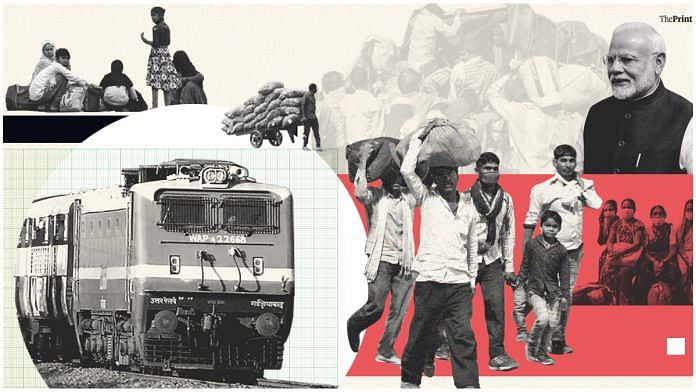About 1,200 migrant workers left Telangana for Jharkhand Friday on a special train. While Bihar, Punjab and Telangana have requested trains, Uttar Pradesh has deployed buses to bring migrants back from neighbouring states. This development coincides with the expected easing of lockdown and industries preparing to partially resume operations after 3 May.
ThePrint asks: Is govt right to send migrants back on trains as lockdown eases & economic activity resumes?
Migrants walking back home are dying, sending them home via trains inevitable
 KK Rao
KK Rao
TRS leader and member of Rajya Sabha from Andhra Pradesh
We have to deal with the most important fallout of the lockdown — migrant workers have been cut off from their families and are going hungry. Many have lost their jobs and are facing psychological distress.
Therefore, it is both the Centre and states’ responsibility to send them home and they have fulfilled it today by running the first special train from Lingampally, Telangana to Jharkhand’s Hatia. Undoubtedly, this was necessary.
One may argue that there is a major risk of infection in trains due to the lack of social distancing, but sending migrants home is inevitable.
Look at the bigger picture — people are dying on highways while walking back home from one state to another. Should we continue letting them die from hunger and agony?
Railways is the only option to carry out this exercise because the roadways will be more tedious and take longer duration. A train can stop at four to five main stations from which migrants can disperse and return home.
Now, as industries resume economic activity after 3 May, they will have to adapt to the changing environment, especially those industries that are heavily dependent on migrant labourers.
Covid-19 lockdown has burdened the migrants; govt must ensure they reach home
 Harsh Mander
Harsh Mander
Retd IAS officer and social activist
The burden of the world’s most stringent lockdown, in India, was thrust on the shoulders of those who were the most vulnerable to this abrupt closure of the entire economy.
Among these were the migrant workers stranded in cities. They build the cities, and provide a range of services, which makes the lives of middle-class people possible. They drive our vehicles, cook and serve us food, care for our children, clean our homes and streets, sell affordable vegetables and fruits and labour in factories.
They do this with no support from the state, without finances or decent homes and without the protection of any of their rights as workers and vendors.
If any of us were caught suddenly without work and food, and were terrified about dying from an illness, which has brought the world to its knees, we would also be desperate to go to the place we call home. We understood this for the students’ abroad and arranged flights for them. The UP government also arranged buses to rescue students stuck in Kota, Rajasthan.
But the government has very different standards for migrant workers. Forced to trek hundreds of kilometres, or crammed into shelters with food given as charity, India’s treatment of its migrant workers is a national shame.
The state can never make amends for this discrimination against the migrant workers. But, at the very least, it has the responsibility to immediately arrange special trains that take every worker, with safety, dignity and at no cost, to their homes.
Movement of migrants a lose-lose situation. Risks virus spread and revival of economic activity
 Ajay Bodke
Ajay Bodke
CEO and chief portfolio manager (PMS) at Prabhudas Lilladher Pvt. Ltd
Migrant workers are persistently demanding to be sent home, despite adequate release of ration by the Centre and its distribution by various states.
The Modi government was reluctant to send migrants home because of two reasons. It feared the medical infrastructure of the native states of migrants to be inadequate. The Centre was also of the opinion that the coronavirus might spread if their premature and ill-planned return was allowed.
Punjab’s SBS Nagar district was Covid-19 free up until recently, before a truck driver entered the place, emerging as a new case. Now, imagine the risk that a 25-hour journey from Telangana to Jharkhand could entail — even if it’s a one-stop train. Home states of migrant workers like Bihar and West Bengal will have to shore up medical infrastructure to ensure that there is no second wave of Covid-19.
On the other hand, economic growth, livelihoods and maintaining social order is at stake. Usually, migrant workers go home for two to three months but I think the searing experience of recent distress will keep them home longer. This means that as the economic activity resumes with lifting of the lockdown, many industries may face manpower shortage due to high dependency on migrant workers, raising costs.
Sadly, it is a lose-lose situation for states at both ends of this human tragedy.
This ‘ghar vapsi’ is foolish, industries will need migrant workers once they resume work after the lockdown
 Ajay Shukla
Ajay Shukla
Former member of traffic, Railway Board
There is no exact estimate of the total number of stranded migrant workers across states but it could be a staggering 10 crore in absolute terms. If they are to be sent back home, it will take weeks by trains and months by buses. This means that the suffering of migrant workers stranded in metro cities is only going to continue.
Not to mention, this task is totally contradictory to the Centre’s plans of opening up economic activity after 3 May, considering that migrant workers are the foot soldiers of most industries. If they go back home, how will these industries survive? Even if we presume that migrant workers are to be brought back to cities within a few weeks, this would involve another mammoth exercise of train journeys.
This type of ‘ghar vapsi’ is foolish and lacks long-term planning, especially if the government is contemplating opening up the economy post lockdown. Once the lockdown is stopped being seen as a solution to Covid-19, and rather a temporary containment measure, the government will be able to see the bigger picture.
Also read: How can Modi govt revive economic activity when CMs want migrant workers to return home?
By Pia Krishnankutty, journalist at ThePrint




(1) Interstate migrant workers Act, 1979 is in force but neither the states nor the Centre got it implemented in any part of the country effectively and thus the Governments of the day have failed to implement rule of law.
(2) Similarly, the Disaster Management Act, 2005 mandates that there must be a district, state and national level action plan containing all the details of the are concerned and also of the public functionaries as well as private and Non Government sector to be used for the management of disaster without much disturbance to the public life of community at large and also with conducive efforts to contain and prevent the spread of effects of disaster, but all have failed in the discharge of their duty in the present time.
(3) With the passage of time since many years, the moral values are deteriorating in all walks of life and it hugely affects the power centres in Governments whether central or state. A drive is going on across the country’ administration to weed out the honest, law abiding public servants who comes in the ways of either corruption or in the ways of wrong and illegal or unconstitutional decisions of the Governments by way of wrong transfers, suspensions, terminations, removals, dismissals etc, which becomes a burden on judiciary which is overburdened already and to overburden the judiciary, the Governments are not filling nearly 35-40% of the sanctioned strength of judges of the High Courts deliberately, as about 80% of the total burden of cases, the Government is one of the party.
Delhi se Bihar Jane ka koi form bhara Raha he par kaha se hamlog ko to kuchh paya hi nahi he
Good and diverse views. Migrants are human, must be treated alike by government.
Encourage the voluntary return of the migrants. In view of the huge shock everyone need a break. Once the situation stabilizes and the migrant work force starts coming back, make it an orderly recorded return so there is no exploitation by the employers and the of the employers by the unions and the NGOs.
This would probably mean a closing down of lot of union, political and NGO shops.
Once the returning workforce is properly recorded based on AADHAR nos. it should be possible to ensure they get all their rights and are housed properly.
We have over the years tried the free movements and whatever else the impractical intellectuals under the garb of human rights have advocated. The covid-19 has taught us a lesson which we cannot ignore. MEASURE, MEASURE, MEASURE
The migrants who want to return must be allowed and The Railways must make a heroic effort to do it quickly. But the migrant exporting states must use this lesson and shame to initiate reforms and industrialize. Emphasis on Maa Mati Manush ie blocking land and labor reforms, no emphasis on education and family planning will be a constant drag on the nation. If the Southern states and western states can do it why not Bengal Bihar Jharkhand and UP
In the circumstance, it is necessary to address the sensitivity of the migrants. After explaining the pros ans cons of the movement back home (with no definite timeline for their return and re- employment), the choice should be left to the workers.
When the responsibility is taken by individuals, it is much easier to handle the ensuing situation either way.
One respects the contrary view, that migrants are needed to revive economic activity, but this is the right decision. Especially the use of trains in place of buses. The SG had told the SC that three out of ten returning migrants could have been infected, which was untrue. Instead of blocking those who were returning, their further journey ought to have been facilitated. The duration of the lockdown could not have been predicted on 24th March. On 1st May, it is clear that economic powerhouses like Bombay and Delhi will remain shut. So the only humane course of action is to let these migrants return home, see them through with food and money transfers. How much and how soon economic activity revives is difficult to predict. For America, Paul Krugman says it will be more like the Nike swoosh than a V shape. A time for the government to show its mettle.